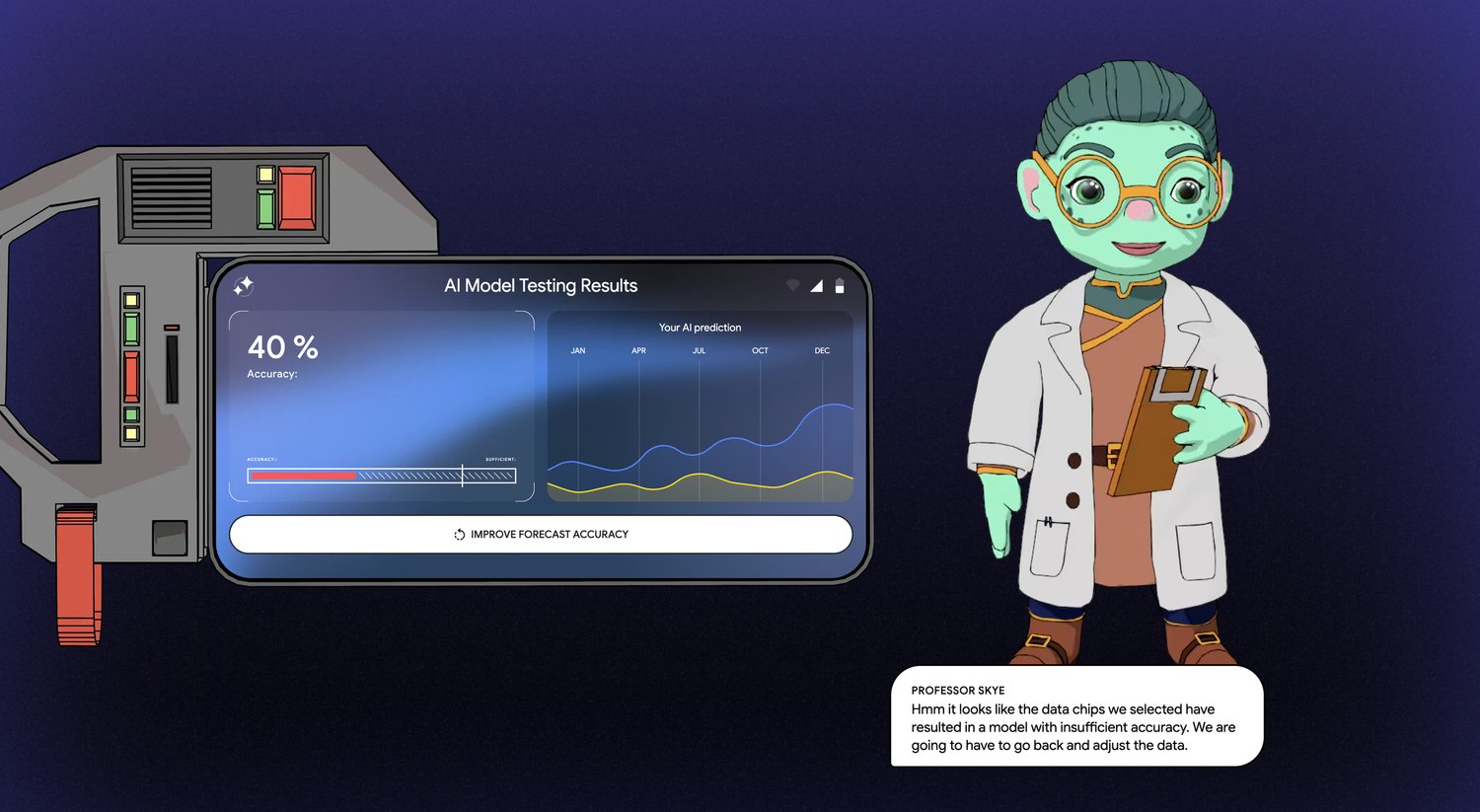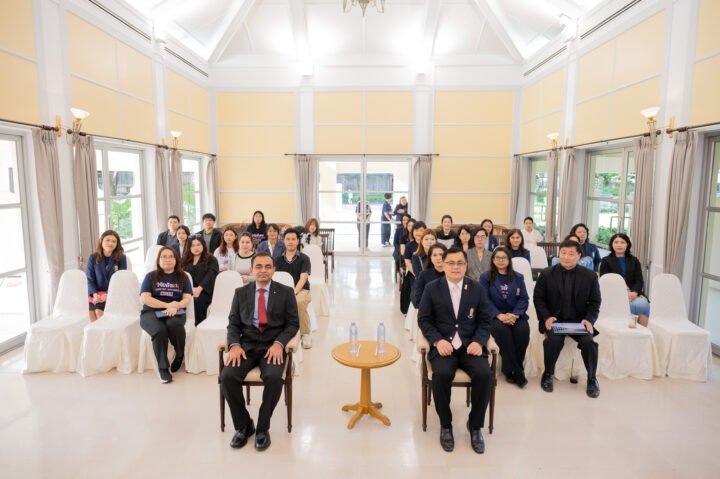AI Research
Google Research and Stanford launch AI Quests for middle school learning

Google Research, the research and development division of Google, has announced AI Quests, an interactive learning experience for students aged 11 to 14.
Developed with the Stanford Accelerator for Learning, the program is designed to build AI literacy by involving learners in projects connected to challenges in areas such as climate, health, and science. The initiative is scheduled for release on September 9, 2025, at 9 a.m. PT.
Quest structure and focus
AI Quests places students in a fantasy environment where they take on the role of AI researchers, guided by an in-game mentor called Professor Skye. Learners are tasked with problem definition, data gathering, model training, and testing in scenarios modeled on real research. The first quest draws on Google’s flood forecasting work, where students examine rainfall and river flow data to anticipate flooding. Future quests will address diabetic retinopathy detection and mapping the human brain through connectomics. Each quest includes messages from research teams discussing responsible AI, as well as teacher guides and pre- and post-game activities.
Rollout and curriculum integration
AI Quests will be available for educators and organizations worldwide. The program will also be integrated into Experience AI, a global AI literacy initiative developed by Google DeepMind and the Raspberry Pi Foundation, and into CRAFT at the Stanford Accelerator for Learning. Additional AI literacy providers will be able to embed AI Quests into their programs, and educators can access it directly through the AI Quests website.
Speaking exclusively to ETIH, Ronit Levavi Morad, Senior Director at Google Research, says: “AI Quests provides an accessible entry point into applied AI. Inspired by genuine research projects at Google Research tackling issues like climate change and public health, AI Quests uses interactive quests to immerse students in compelling, real-world problems. Through gameplay, students step into the role of AI researchers, navigating tasks that mirror the key stages of the AI project lifecycle – from problem definition and data collection to model training, testing, and deployment.”
The ETIH Innovation Awards 2026
AI Research
From static to adaptive: Scaling AI reasoning without the waste

Most systems that employ reasoning today rely on static reasoning: every input gets the same model, the same prompt and the same depth of reasoning, leading to inefficiency and wasted time and money. A trivial query might get over-processed, driving up cost and latency. A complex, high-stakes task might be underserved, leading to risky errors.
In my view, the next frontier in production-ready reasoning is adaptive reasoning: AI systems that allocate just the right amount of reasoning per input, balancing accuracy, cost and latency in real time. For CIOs, adaptive reasoning may be a new operating model for how enterprise AI systems should be designed, deployed and scaled.
What are reasoning language models (RLMs)?
Reasoning language models are language models that can generate a thinking process. They start with a question, produce reasoning steps and arrive at an answer. RLMs can move beyond simply mapping an input to an output; they can actively engage in a multi-step decision-making process.
AI Research
University of Cincinnati launches AI Ethics Center

CINCINNATI — As artificial intelligence technology continues to evolve at a rapid pace, a group of researchers at the University of Cincinnati is launching a new initiative to ensure that ethics keep up.
Backed by nearly $500,000 in funding from the National Endowment for the Humanities and $165,000 in seed money from UC’s College of Arts and Sciences, the university has announced the formation of the Center for Explainable, Ethical, and Trustworthy AI, or CEET.
“AI looks like it’s going to be one of the most impactful and maybe revolutionary technologies of our lifetime,” said Andre Curtis-Trudel, assistant professor of philosophy at the University of Cincinnati. “That makes it one of the most exciting things to be thinking about, especially from ethical perspectives.”
The center, still in its early stages, will serve as an interdisciplinary hub bringing together faculty and researchers from a wide range of fields, including philosophy, English and physics to address how AI systems are developed, used, and understood.
“AI impacts everyone, but it’s not the case that everyone has the opportunity to contribute to conversations around AI,” Curtis-Trudel said. “In particular, about how it’s being used.”
CEET’s work is split between two main branches: a research team focused on the broader societal and ethical questions surrounding AI, and an engagement team tasked with transforming those findings into public-facing educational initiatives. That includes programming for students in the K-12 system, a key focus of the center’s outreach efforts.
“Students are increasingly going to be asked to use AI tools, and their lives will involve AI in one way or another,” said Curtis-Trudel. “It’s important that they understand how these tools work and are able to reason about them.”
Dean James Mack of UC’s College of Arts and Sciences emphasized the importance of including humanities scholars in the conversation around AI, which he says has traditionally been dominated by science and tech fields.
“This is not just a scientific or technological challenge,” Mack said. “This is a humanistic challenge that’s going to affect society, one that’s going to influence policies, not just in relation to AI but entire communities.”
Mack said the center also aims to help set ethical boundaries that prioritize public safety and social good.
“Every tool that’s in a doctor’s office can always be used to harm or to help,” Mack said. “We have to understand that the goal is to help individuals, not harm them.”
While CEET doesn’t yet have a physical space on campus, Curtis-Trudel hopes the center will position the University of Cincinnati as a national leader in humanities-driven AI research and policy.
“Our aim is to become a first port of call, a hub, for anyone interested in AI ethics,” he said.
Center staff say they are also exploring private partnerships and additional fundraising opportunities to support the initiative’s long-term goals.
AI Research
Driving Innovation in Learning and Research at Chula through AI – Chulalongkorn University

On September 5, 2025, the Social Research Institute of Chulalongkorn University organized an international public lecture titled “AI in Higher Education for Innovation in Learning & Research”, delivered by Dr. Muthu Kumar Chandrasekaran, an expert in artificial intelligence and computer technology and former Applied Science Manager at Amazon AI, at Chula Narumit House. The event was officially opened by Professor Dr. Wilert Puriwat, President of Chulalongkorn University, with Associate Professor Dr. Unruan Leknoi, Director of the Social Research Institute, delivering the welcoming remarks. A panel discussion followed, featuring Dr. Philip Soung Soo Cho, a researcher at Chula’s Social Research Institute.


President, Chulalongkorn University

Director, Social Research Institute, Chulalongkorn University

Expert in Artificial Intelligence and Computer Technology and former Applied Science Manager, Amazon AI
Objectives of the Lecture
The lecture aimed to create a platform for knowledge exchange on Artificial Intelligence (AI) between international experts and Thai academics. It also sought to provide guidance on enhancing the quality of teaching and research in Thai universities to meet global standards.
Elevating Thai Universities to the Global Stage:
The session shared best practices for applying AI to improve teaching and research. The evolution began during the MOOC era (2012–2020), with platforms such as Coursera, Canvas Network, Diversity, and Udacity.
In the pre-Generative AI era, AI applications focused on:
- Automated grading systems
- Assessing participation in online classrooms
- Scripted intelligent tutoring systems
In the current era of Generative AI and Agentic AI, developments have become more personalized, enabling the creation of personal AI tutors and positioning AI as a key tool for future learning.
Building International Networks:
The event brought about greater opportunities for collaboration between Chulalongkorn University and global academic and tech experts, reinforcing Thailand’s role in the international AI discourse.
Empowering Thai Society:
The lecture emphasized the need to equip the new generation with AI literacy, ensuring sustainable innovation. It also stressed the importance of:
- Developing inclusive AI policies
- Investing in technology and education
- Ensuring equitable access to AI tools and infrastructure
Despite AI’s potential to disrupt future labor markets and the growing concern over job displacement, it also presents new career opportunities. To adapt, reskilling and upskilling of the workforce remain essential, as people are the core driving force behind national progress. Sustainable investment in data centers was also highlighted as a key factor.
-

 Business2 weeks ago
Business2 weeks agoThe Guardian view on Trump and the Fed: independence is no substitute for accountability | Editorial
-
Tools & Platforms4 weeks ago
Building Trust in Military AI Starts with Opening the Black Box – War on the Rocks
-

 Ethics & Policy1 month ago
Ethics & Policy1 month agoSDAIA Supports Saudi Arabia’s Leadership in Shaping Global AI Ethics, Policy, and Research – وكالة الأنباء السعودية
-

 Events & Conferences4 months ago
Events & Conferences4 months agoJourney to 1000 models: Scaling Instagram’s recommendation system
-

 Jobs & Careers2 months ago
Jobs & Careers2 months agoMumbai-based Perplexity Alternative Has 60k+ Users Without Funding
-

 Podcasts & Talks2 months ago
Podcasts & Talks2 months agoHappy 4th of July! 🎆 Made with Veo 3 in Gemini
-

 Education2 months ago
Education2 months agoMacron says UK and France have duty to tackle illegal migration ‘with humanity, solidarity and firmness’ – UK politics live | Politics
-

 Education2 months ago
Education2 months agoVEX Robotics launches AI-powered classroom robotics system
-

 Funding & Business2 months ago
Funding & Business2 months agoKayak and Expedia race to build AI travel agents that turn social posts into itineraries
-

 Podcasts & Talks2 months ago
Podcasts & Talks2 months agoOpenAI 🤝 @teamganassi

